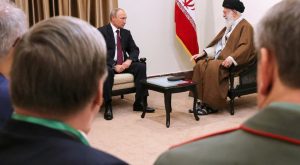On Wednesday, November 1, Russian president Vladimir Putin met with the Iranian Supreme Leader Ali Khamenei and President Hassan Rouhani. Putin was visiting Tehran for trilateral talks with Iran and Azerbaijan’s President Ilham Aliyev but, as expected, Iran-Russia bilateral relations and the nuclear deal dominated the conversation, like reported by iranwire.com.
Declaring Moscow’s support for the nuclear agreement, the Russian president said, “We are opposed to any unilateral change in the provisions of this multilateral agreement, and we consider unilateralism as a violation of the international law and system.” In return, Ayatollah Khamenei called Putin “a strong man, determined to make decisions and take action,” whose position on the nuclear deal is “very good.”
At their last meeting in late 2015, Khamenei also had laudatory words for Putin, describing him as a “prominent figure.”
Khamenei’s recent praise for Putin was mostly directed at Tehran-Moscow cooperation in the Middle East and shared efforts to stand up to the United States. Replacing the dollar as the international currency was one of his key goals. “By ignoring the negative propaganda of the enemies that seek to weaken relations between countries,” said Khamenei, “we can nullify US sanctions, using methods such as eliminating the dollar and replacing it with national currencies in transactions between two or more parties — thus, isolate the Americans.”
Bilateral currency agreements are indispensable to achieve this dream. But in early 2017, Iranian officials announced that because of conditions set by the Russian Central Bank, a bilateral currency agreement was not possible. Now, with this announcement by the Supreme Leader, it is expected that Iran will redouble its efforts to reach such an agreement.
The other proposition Ayatollah Khamenei put forward was the expansion of economic exchanges between the two countries. He specifically mentioned the transportation sector, “using the main axis of Chabahar port to the port of Saint-Petersburg.” Chabahar is Iran’s main port on the Gulf of Oman, a relatively short distance away from the Indian Ocean. Access to the port has long been a big dream of Russian rulers, from the tsars to the communist regime to, one can assume, Vladimir Putin.
Usually the president of the Islamic Republic or other senior officials are the ones to put forward proposals for expanding economic relations. By speaking about economic expansion himself, Khamenei appears to want to leave no doubt that Iran plans to strengthen bilateral relations with Russia. “The good combination and the cooperative resistance of Tehran and Moscow against the sedition and corruption of terrorists in Syria is significant, and it has made Russia an influential player in the Western Asia region,” said Khamenei.
A “Strategic Partner”
Putin was no less enthusiastic about Tehran in his pronouncements. During the meeting, which lasted about an hour and 15 minutes, the Russian president expressed his satisfaction with his visit and his meeting with the Supreme Leader. “We consider Iran a strategic partner and a great neighbor, and we will take advantage of every opportunity to expand and consolidate relationships in all dimensions,” he said. He talked about expanding military and defense cooperation between the two countries as well as his opposition to any unilateral changes to the nuclear agreement (the JCPOA). Like the Supreme Leader, he praised the cooperation between Iran and Russia in Syria.
And Putin’s comments about US sanctions against the Islamic Republic resembled what Khamenei has been saying for years. He emphasized the importance of relying on domestic capabilities as the country’s main policy and a bulwark against US sanctions. “Some Russian producers and traders prayed that the US sanctions wouldn’t end,” he said, “because as a result of them, their capacities have started to attract attention. From 2014 — i.e., the start of US sanctions — we devoted our funds to scientific and technological progress, and we had significant growth in the fields of biotechnology, information technology, agriculture, and space industries. Now, in spite of the initial concerns, we have realized that we can do whatever we decide to.”
The similarities, even if accidental, could supply the Iranian Supreme Leader with good propaganda tools for pursuing his dream of a “resistance economy.”
Following the nuclear agreement, and especially after US President Donald Trump’s refusal to re-certify the nuclear deal, Khamenei has been trying hard to present a strategic alliance with Russia and China as the right prescription for Iran’s foreign policy.
But things are not so simple. Iranians have a deep, historical mistrust of Russians and the economies of both countries are weak. Still, the Supreme Leader hopes to overcome these obstacles, and Putin’s visit has certainly given him hope.



